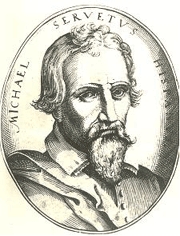On this date in 1553, Spanish physician Michael Servetus, né Miguel Serveto, was executed for heresy in Geneva, Switzerland. Born in 1511, Servetus grew up near Aragon and studied law at the University of Toulouse in France, where he first read the bible, only newly available in printed form. Struck by the absence of mention of the trinity in the bible and repelled by the excesses of the Catholic Church, he turned to Protestantism. Its proponents also cast him out for his views.
In Paris he met a young student, John Calvin, who at one time was forced himself to go into hiding for heresy. Servetus studied medicine at the University of Paris, where he published the first work accurately describing pulmonary circulation. He practiced medicine for 12 years in Vienne, France. In 1546 he started a fateful, heated correspondence on the trinity with Calvin, who wrote a colleague that if Servetus should ever visit Geneva, “if my authority is of any avail I will not suffer him to get out alive.”
Servetus published Christianismi Restitutio (The Restoration of Christianity) under a pseudonym in 1553, including 30 of his letters to Calvin. In it he rejected original sin and salvation, vicarious atonement and Christ’s dual nature. When he sent Calvin a copy, Calvin exposed Servetus’ identity to the Catholic Inquisition in Vienne. Arrested and interrogated, he escaped from prison but was arrested in Geneva while traveling to Italy.
The Protestant Council of Geneva convicted him of anti-trinitarianism and opposition to child baptism. Calvin lobbied for a beheading but the council sentenced him to be burned at the stake, where he was burned alive at age 42 atop a pyre of his own books on Oct. 27, 1553.


